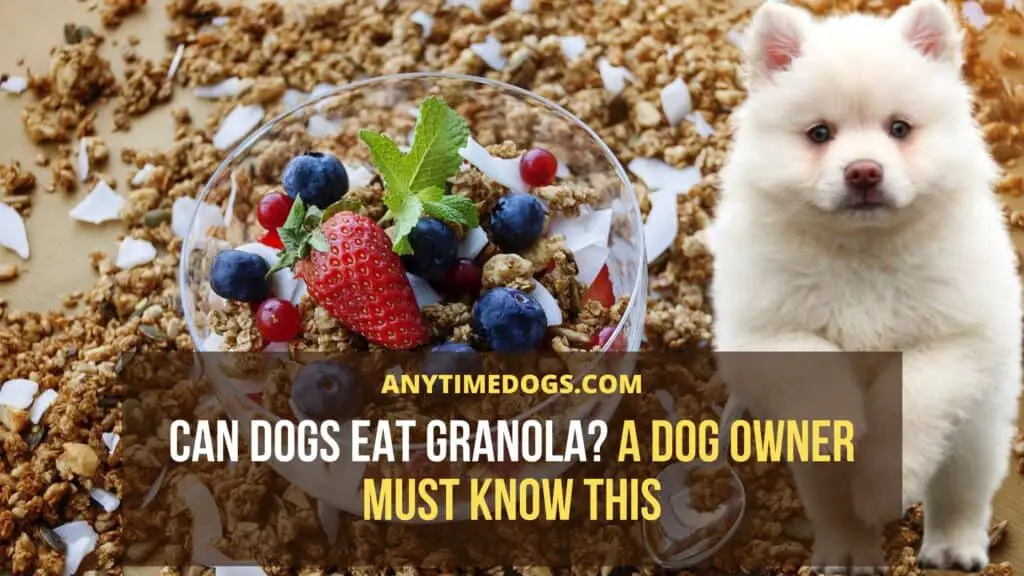Granola bars have become a popular option for breakfast. It has a lot of having healthy qualities in it. You can find them almost anywhere. There are many types of granola bars, but is it safe for your canine companion? Can dogs eat granola?
Yes, dogs can eat granola but you must check the ingredients list before feeding it to them.
We are aware of the fact that dogs have different food requirements than humans. You might be wondering; if you kick off your mornings with a bar of granola, your dog should eat as well!
This article will cover queries related to dogs and their relation with granola bars. So, let’s dig deeper and find out!
Can Dogs Have Granola?
The answer is Yes, dogs can eat granola, but it all depends on the ingredients that it contains. You can feed a small amount of it as long as it doesn’t contain toxic ingredients like nuts, raisins, or chocolate.
Dogs love to eat chewy food, and granola bars are one of such items. The crunchy texture of this food makes a perfect snack for them.
Granola is a highly processed food. It is rolled in oats and puffed brown rice. It also contains sugar, salt, almonds, and many other ingredients.
Granola is a high-fiber food, and this is why your dog shouldn’t eat it regularly. Only a moderate amount is suitable for them.
Health Benefits Of Granola For Dogs
If you want to keep your dog happy, give them a taste of this crunchy food as a treat, in a moderate amount every now and then. It will not only keep your pet happy but will also provide some vital nutrients.
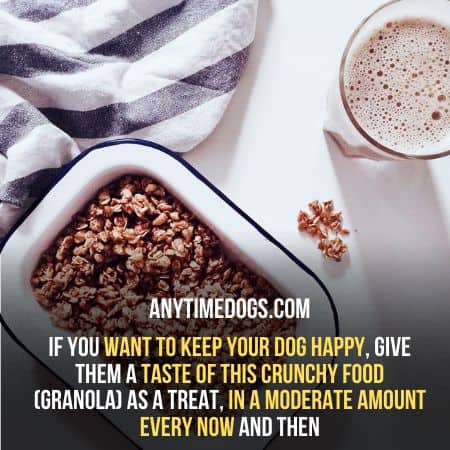
If we talk about 100 grams of granola it contains:
- Vitamin A – 286 µg
- Vitamin C – 2.7 mg
- Iron – 4.04 mg
- Potassium – 367 mg
- Calcium – 62 mg
- Protein – 0.68 g
- Carbohydrates – 72.40 g
- Dietary fibers – 6.9 g
- Calories – 407 kcal
Let’s take a look at how these nutrients help in promoting the good health of your dog:
- Proteins – It helps to strengthen the immunity system in dogs. It also produces antibodies, enzymes, hormones, and also repairs cells and tissues.
- Carbohydrates – It helps in providing energy to the dog. They are the foundation of all other nutrients.
- Dietary fibers – It performs the same function as it does in humans. It maintains the gastrointestinal system and prevents diseases like bowel syndrome.
- Calcium – It helps to strengthen bones, teeth, and muscles.
- Potassium – It helps in regulating blood vessel functions in dogs.
Granola provides a high amount of calories. Suppose you are training your German Shepard. This snack will provide enough energy to them during sessions.
What Granola Ingredients Can Be Toxic For Dogs?
You got your answer to the question that can dog eat granola. But store-bought granola bars have a few ingredients that are not suitable for your dog.
Let’s have a look at what those toxic ingredients are:
- Nuts – granola bars often contain macadamia nuts. These are a complete NO for dogs as they can cause vomiting, hyperthermia, and depression.
- Raisins – It is another toxic ingredient for dogs as it can cause kidney failure. Watch out before feeding it daily!
- Additives – Artificial sweeteners like xylitol is extremely poisonous for dogs. If you decide to feed a granola bar to your pet, make sure it doesn’t have it.
Likewise, unsweetened whipped cream is advisable for dogs. The same is with a granola bar that it should be free from preservatives and additives.
Why Is Granola Not A Good Idea For Dogs?
Granola bars came into existence as a breakfast option for humans.
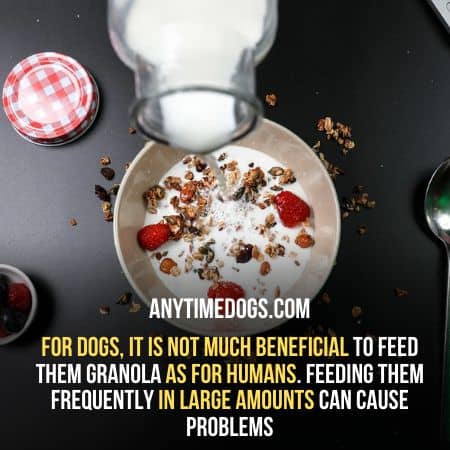
For dogs, it is not much beneficial as for humans. Feeding them frequently in large amounts can cause problems because:
1) Excessive Sugar:
Sugar in any form like honey, molasses, nectars, etc. should not be a significant part of your dog’s diet.
Regular intake of sugar can complicate your dog’s health. It can cause obesity, diabetes, and dental cavities too.
Food like marshmallows and other sweets are made to satisfy our sweet tooth. It isn’t safe for dogs at all.
2) High Level Of Fibers:
Granola has a high amount of fiber in it, and it is not beneficial for dogs.
Greater fiber consumption can lead to diarrhea and other digestive issues.
3) High Amount Of Fat And Cholesterol:
Usually, granola consists of refined fats or canola oil which is not healthy for dogs. After all, who wants their pet to be obese and lethargic?
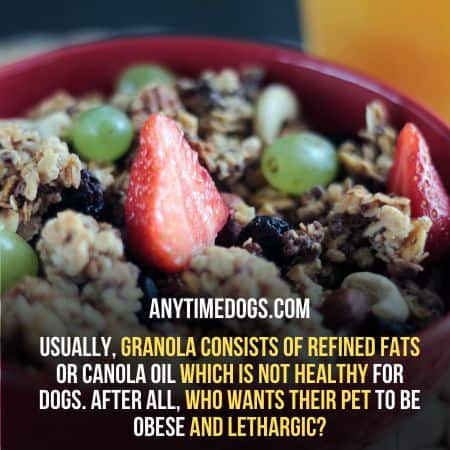
If you want your dog to remain active and healthy, the best choice you can make is to avoid giving fatty nuts.
These nuts are cashews, pecans, walnuts, and almonds.
Granola bars also have cholesterol in them. If you feed it to your dog in large quantities, the chances are that your dog might develop heart problems.
Atherosclerosis is one such disease due to high cholesterol consumption. It causes blockage of arteries leading to a heart attack.
4) Risk of Choking & Blockage:
Granola is grainy in texture due to the presence of small bits and pieces of nuts and seeds in them.
Dogs are quick in gulping down the food. Granola can create a choking hazard in dogs if they eat a massive piece of it at once.
This choking can cause blockage in the respiratory tract. It can cause breathing problems, and your dog will require medical attention.
How Can You Serve Granola To Your Dog?
Most of the dogs love to eat granola as it is. But if you want to add a little creative element to your dog’s food, you can do it in several ways.
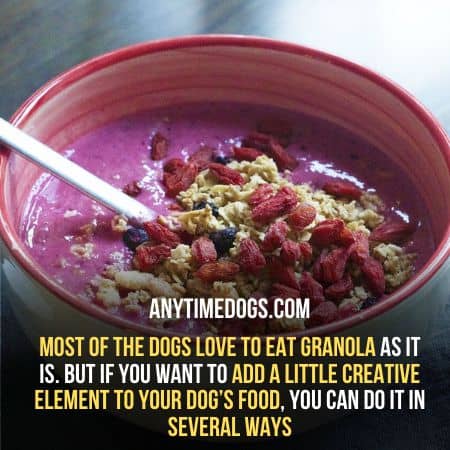
Dogs love to chew on crunchy snacks, but it can be harder for them to digest. Mix granola with sour cream or yogurt, so that digestion becomes easy.
To give them a small quantity, you can also sprinkle some granola pieces on peanut butter.
In this way, your dog will enjoy munching on the treatment because of the creamy texture.
There are several types of granola out there. But the best one for your pup is the “whole-grain” because it has oats over it and puffed brown rice.
Symptoms Of Excessive Consumption Of Granola:
Earlier, we talked about some ingredients that can be harmful and toxic to dogs.
But the question is, how will you know that if your dog has overeaten it?
The first thing that can happen is diarrhea. Other than that, vomiting can also be a symptom. To avoid such a situation, do not give more than half a cup or a single bar of granola in a day.
You can treat temporary diarrhea at home by giving him plenty of water and soft, warm food. If the condition worsens, contact a vet ASAP!
Can Puppies Eat Granola?
Well, you read why granola isn’t an appreciable idea for dogs. The excessive amount of sugar is the sole reason that can negatively affect an adult dog’s health. No wonder it can do to puppies.
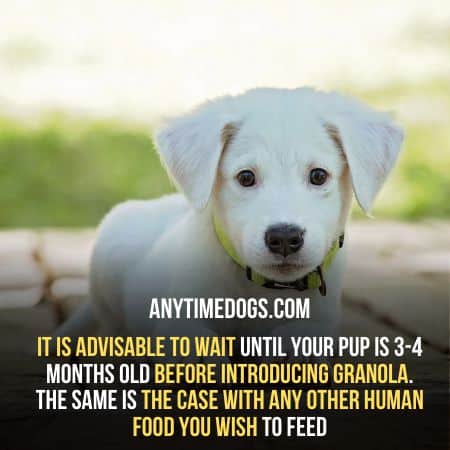
It is advisable that you should wait until your pup is 3-4 months old before introducing granola. The same is the case with any other human food you wish to feed.
How To Make Granola At Home?
It is pretty easy to prepare safe granola, free from toxic ingredients for your dog at home. All you need is:
- Rolled oats
- Nuts or seeds that are non-toxic for dogs
- Unrefined oil
- Dried fruits except for raisins
- Salt and some spices
- Natural sweeteners.
Now, if you are solely making it for the purpose to feed it to your dog. Only use a handful of ingredients so that it is an entirely safe treat for your dog.
If your dog loves peanut butter, you can make peanut butter crunchies. It comprises rolled oats, three different types of seeds along with some dried fruits.
You can also add a maple if you are looking for a substitute for artificial sugar.
Concluding Thoughts:
To summarize this topic, we would say that granola is safe for your dog.
As long as it does not contain toxic ingredients like macadamia, xylitol, or chocolate in them.
These three ingredients enhance the flavor of granola bars. It is entirely human food. This is why manufacturers use it in their products.
While you enjoy eating granola, you can see your dog hovering around so that they can get a bite. You cannot resist sharing your food with them.
But, being a pet owner is all about being careful; you cannot give them everything that you think is yummy.
Dogs have different nutritional needs than humans. Of course, your dog will eat whatever you feed them.
But the question is, do they really need it? Certainly not.
The same is the case is with granola; it is not vital for living. Your dog can do quite well without it too. However, if you wish, you can give it in moderate amounts and infrequently.
With that being said, this article covered all the aspects of whether or not your dog can feed over granola. We hope that it helped you make the right decision.

